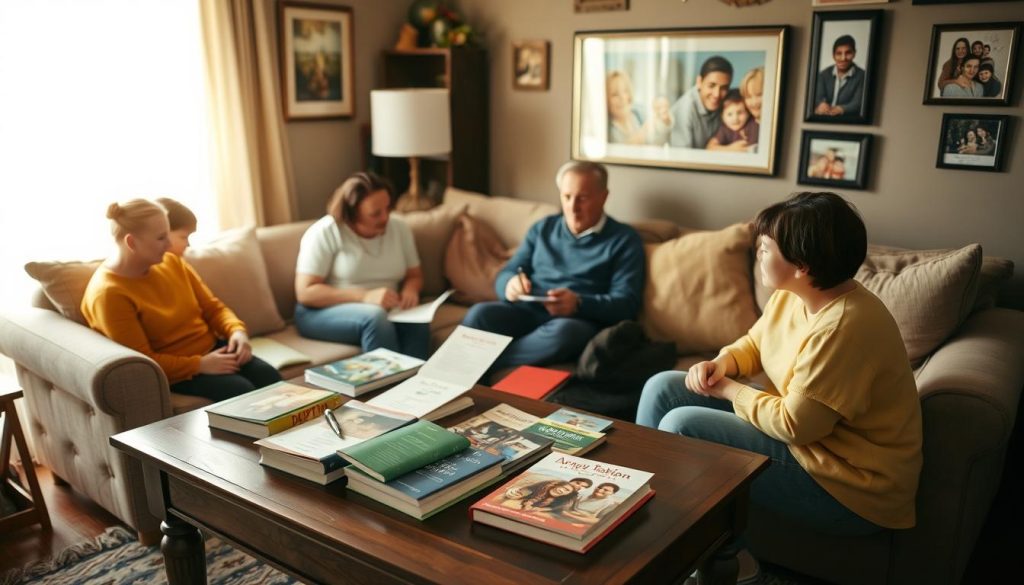Talking about adoption with your teenager can be tough. They’re at an age where they think deeply and ask lots of questions. It’s key to be open and caring in these talks, knowing they’re ready to understand.
Young kids usually accept adoption easily. But as they get older, they start to wonder more. They see they got a family but also lost one, which can make them feel torn.
Teens often think a lot about their birth families. They might want to find them, especially if their adoption was closed. This time can be hard, especially for those who have been through tough times or were adopted later.
It’s vital to make your teen feel safe to talk about their adoption. Remember, they grow emotionally at their own speed, especially if they’ve faced trauma. Many adopted kids do well as they grow up, even facing tough times.
Key Takeaways
- Start discussing adoption early to create a comfortable atmosphere for open communication.
- Provide tangible items like scrapbooks and journals to help understand their adoption journey.
- Use age-appropriate language to address questions and share adoption stories.
- Acknowledge both the challenges and joys of adoption to help teens process conflicting emotions.
- Select adoption books and resources that depict the complexities of adoption.
- Encourage open dialogue to support your teen’s emotional development and identity formation.
- Recognize the unique needs of your teenager and tailor your approach accordingly.
Understanding the Adoption Process
Adoption is when a child’s birth parents give up their rights to the adoptive parents. This creates a new, permanent family. It’s important to know about the adoption process to support and inform families.
What is Adoption?
Adoption is a legal and emotional journey. Adoptive parents gain full rights and responsibilities for a child. It gives a child a permanent home and ensures their well-being.
More than 117,000 children and teenagers are in *foster care* waiting for homes. This shows how vital it is to understand adoption well.
Different Types of Adoption
There are many *types of adoption*, each with its own process and rules:
- Domestic Infant Adoption: Adopting a baby from birth parents in the U.S., often through private agencies.
- Foster Care Adoption: Adopting a child from *foster care*, usually for free or low cost. Many states encourage fostering before adopting.
- International Adoption: Adopting a child from another country, which involves complex laws.
- Stepparent Adoption: When a stepparent adopts their spouse’s child, often easier due to the family bond.
- Transracial Adoption: Adopting a child of a different race, which requires thinking about cultural heritage.
The Role of Foster Care in Adoption
The *foster care system* is key in adoption:
- It offers a temporary home for children until they are adopted.
- Half of the children in *foster care* go back to their birth families, showing it’s a temporary solution.
- Children available for foster care adoption are often older, highlighting the need for families for them.
- States often require dual licensing for foster and adoptive parents, making the process easier.
- Adopting from foster care usually involves working with state-contracted agencies.
- Financial help is available to cover costs and support the child’s needs.
- Foster care *adoption process* helps children experience fewer moves, providing stability.
Knowing about foster care in adoption is vital for prospective parents. It offers a way to parent sooner and assess compatibility.
| Types of Adoption | Key Features |
|---|---|
| Domestic Infant Adoption | Adopting directly from birth parents within the U.S. |
| Foster Care Adoption | Adopting from the foster care system; minimal costs |
| International Adoption | Adopting from another country; complex regulations |
| Stepparent Adoption | Stepparents adopting their spouse’s child; simpler process |
| Transracial Adoption | Adopting a child of a different race; cultural considerations |
The Importance of Communication
Open and honest communication is key in dealing with adoption’s complexities. It’s vital to let adopted teens share their thoughts and feelings freely. This helps their emotional health. By talking openly, parents can help their teens face adoption’s challenges.

Why Open Dialogue is Crucial
Talking openly about adoption is important for many reasons. It lets teens process their feelings and questions about their past. Clear and honest info helps them grow emotionally. It also builds trust and security, making them feel safe to share sensitive topics.
Tips for Effective Conversations
Effective communication in adoption needs a thoughtful approach. Here are some tips for meaningful talks:
- Be Proactive: Start the conversation about adoption. This shows you’re open and willing to talk.
- Listen Actively: Really listen to what your teen says. Show empathy and validate their feelings.
- Respond with Empathy: Teens may have mixed feelings and questions. Answer with patience and understanding.
- Be Honest: Share what you know about adoption and their biological family. Honesty helps them understand their identity.
- Age-Appropriate Conversations: Talk in a way that fits your teen’s age and maturity level. What’s right for a child isn’t always right for a teen.
Using these tips can make conversations about adoption easier and more comforting. It helps create a supportive space where teens feel heard and valued.
“Respecting and valuing a child’s thoughts and opinions can lead to better communication.”
With these strategies, you can improve your talks about adoption. This ensures a healthy dialogue that supports your teenager’s emotional and psychological growth.
| Benefits of Effective Communication | Strategies |
|---|---|
| Foster Emotional Growth | Active Listening, Empathy |
| Build Trust | Transparency, Honest Responses |
| Reduce Confusion | Proactive Initiation, Age-Appropriate Discussions |
Timing Your Discussion
Deciding when to talk about adoption with your teenager is tricky. It’s vital to pick the right moment, when they’re emotionally and mentally ready. Starting these talks early and revisiting them helps your child understand their adoption story as they grow.
When to Start the Conversation
Experts say it’s good to start talking about adoption early, even with babies. This gradual approach helps make the topic feel normal. For kids who have been in foster care, talking about their past early can help with emotional issues.
It’s important to use positive words when talking about adoption. Be honest about their past, even if you don’t have all the details. Foster parents should share what they know about the birth family, highlighting the importance of biological ties.
Signs Your Teen is Ready to Talk
Knowing when your teen is ready to talk about adoption is crucial. They might show signs like asking questions or showing interest in their birth family. Emotional reactions to adoption topics at school or with friends are also important signs.
These signs mean they’re open to learning more about their adoption story. Be patient and supportive as they explore their identity. Create a safe space for them to share their thoughts and feelings.
| Indicator | Description |
|---|---|
| Questions About Background | Increased curiosity about their adoption story and birth family. |
| Interest in Birth Family | Seeking information or expressing a desire to learn more about biological relatives. |
| Emotional Responses | Notable emotional reactions to adoption topics discussed at school or with friends. |
Addressing Emotions and Questions
Adopted teenagers often feel a mix of emotions. They might feel curious, confused, angry, or sad. It’s important to talk about these feelings with care and understanding.
Common Feelings in Adopted Teens
Adopted teens face many emotions because of their adoption stories. The American Academy of Pediatrics says almost 80 percent of these kids have mental health needs. Issues like developmental delays and ADHD can make it hard for them to handle their feelings.
- Curiosity: Teens often wonder about their birth parents and why they were adopted.
- Confusion: They might feel unsure about their identity and where they belong.
- Anger and Grief: Some teens feel angry or sad about their adoption and the loss of their birth family.
Professional counseling can help with these mental health issues. For example, The Up Center helped over 800 clients in 2022, with 82 percent showing improvement.
FAQs About Adoption
Adopted teenagers have many questions that need honest answers:
- Why was I adopted? Teens want to know the reasons behind their adoption.
- Who are my birth parents, and do I have siblings? They often ask about their biological family, which is very personal.
- What is my medical history? Knowing their medical background is important, especially if they have inherited conditions.
It’s crucial to have open and honest talks about these questions. Adoptive parents should offer support and create a safe space for teens to share their feelings.
Regular exercise, like walking or yoga, can help with emotional balance. Stress-relieving toys and noise-canceling headphones can also help teens manage their emotions.
Adoptive parents should be patient and understanding. Remember, the prefrontal cortex in teenagers, especially those with early trauma, develops later, often in their twenties or later.
| Support Strategies | Benefits |
|---|---|
| Professional Counseling | Addresses mental health issues and provides coping mechanisms |
| Regular Exercise | Maintains emotional balance and reduces stress |
| Open Conversations | Encourages teens to express feelings and ask questions |
| Use of Stress-Relieving Toys | Helps manage anxiety and improve focus |
Understanding and addressing the emotional impact of fostering and adoption is key. By being compassionate and supportive, parents can help their adopted teenagers deal with these complex emotions. This way, they can feel a sense of belonging and security.
Normalizing the Adoption Conversation
Adoption is a big part of many families. It’s important to talk about it often to make everyone feel accepted. By sharing the truth about myths about adoption, you help your teenager feel secure and accepted.
How to Make it Part of Family Life
To make adoption a normal part of your family, start by sharing positive stories. Talk about how adoption makes your family special. Remember, your family is just as loving and capable as any other.
Adoption expert Sally Bacchetta says it’s important to avoid negative words. Words like “less than,” “bad,” or “weird” can hurt. Instead, focus on the love and connection in your family.
Overcoming Stereotypes and Myths
It’s key to tackle myths about adoption to help your teen have a healthy view. By talking about and debunking stereotypes, you create a more open and honest space. For example, 74% of adoptive parents feel awkward talking about adoption. By facing these challenges, you can reduce stigma and support your teenager better.
- Positive Reinforcement: Celebrate the strengths and diversity that adoption brings.
- Open Dialogue: Encourage your teen to share their thoughts and feelings.
- Real-life Examples: Use stories and media, like “Modern Family,” to show adoption in a positive light.
By following these steps, your teen will see adoption as a positive part of their life. This approach helps build a strong sense of self and normalizes adoption in your family.
Supporting Your Teen’s Identity
Helping an adopted teen find their identity means understanding their unique view and encouraging them to explore themselves. Parents are key in this journey, guiding them through the complexities of their cultural background and personal history. It’s important to recognize the specific challenges and emotions adopted teens face to create a supportive environment.
Understanding Their Unique Perspective
Adopted teens have emotional challenges in forming their identity that differ from those in childhood. Their experiences of adolescence and adoption are intertwined, requiring specific support. They may feel mixed emotions during important times like high school graduation, due to past disruptions.
Parents can support their teens by acknowledging these feelings and providing a safe yet challenging environment for growth.
Parents are encouraged to accept the depth of feelings in their adopted teens and offer consistent support for exploring their history.
It’s important to understand that separation from biological parents can be traumatic. This can leave lasting effects on their brain, body, and soul. Parents can empathize with their teen’s experiences by encouraging open communication. This allows teens to reflect on their past and find a sense of belonging in their adoptive family.
Encouraging Self-Exploration
Encouraging self-exploration is crucial for foster teens to form a well-rounded identity. Providing access to resources about their cultural heritage and being open to exploring their personal history empowers them. This helps teens connect with their roots positively.

- Adopting teens should be encouraged to research their cultural history, which can include learning about traditions, language, and customs.
- Participating in cultural events or groups related to their heritage can provide a deeper connection and source of pride.
- Parents can read books or watch documentaries with their teens that address themes of cultural identity in adoption.
Involving adopted teens in activities that highlight their personal history can help them feel more connected. Many adopted children intensify their search for their history during their teen years. This can include using the Internet to find birth parents or relatives.
Creating an open line of communication helps teens navigate these endeavors responsibly. It’s important to involve them in activities that underscore their personal history.
- Consider facilitating meetings with birth families if it is deemed safe and appropriate.
- Encourage teens to express their feelings and thoughts about their adoption journey.
- Provide professional help or counseling if needed to address any struggles with identity.
Support groups for teens and parents, along with adoption-competent counseling services, can be invaluable. Effective communication, negotiation, and understanding are key in supporting your adopted teen through their unique path of identity formation.
Resources for Families
Adoptive families find great help in different adoption support resources. Books, literature, support groups, and counseling services offer crucial guidance and community support. These tools help families understand their journey better.
Books and Literature on Adoption
Books and literature are full of knowledge and shared experiences. They help families understand the adoption process and emotional challenges. These materials bridge theory and practice, helping families navigate their journey with confidence.
Support Groups and Counseling Services
Support groups and counseling services provide a safe space for families. They connect with others facing similar challenges. These platforms offer emotional support and practical advice from adoption experts.
Best adoption agencies also offer specialized support. They help with financial support and health coverage. Working with these agencies can make the adoption process smoother and improve family well-being.
Involving Your Teen in Adoption Topics
Getting teens involved in adoption topics can change lives. It helps parents and kids connect more deeply. It also makes teens feel like they belong.
Many teens in foster care face big challenges. This makes it even more important to get them involved in adoption awareness.
Creating a Shared Learning Experience
Learning together is a great way to talk about adoption. You and your teen can go to workshops or conferences. Or, you can help out in community programs.
These activities teach valuable lessons. They also make your teen feel heard and understood in their adoption journey.
For example, over 20,000 youth in foster care age out each year without a home. Only 50 percent graduate high school, and just 3 percent get a four-year degree. By learning about these stats together, you build empathy and understanding.

Encouraging Participation in Adoption Awareness Events
Getting your teen to join adoption events can strengthen community bonds. These events can be local fairs or national conferences. They feature people with real adoption stories.
Being part of these events shows your teen they’re part of a bigger effort for change. It’s very empowering.
For instance, nearly half of youth in foster care become homeless within eighteen months after aging out. By joining these events, your family can support adoption awareness more strongly. It’s also important to note that younger kids get adopted faster, while teens stay longer. By encouraging your teen to get involved, you help break this cycle and raise awareness in your community.
The Role of Extended Family and Friends
Extended family and friends are key in an adopted teen’s life. It’s important to teach them about adoption to create a supportive space. This helps foster an inclusive environment that focuses on the teen’s emotional health.
How to Educate Relatives About Adoption
Begin by sharing your family’s adoption story. Explain how it’s vital to create a caring environment for the teen. Give relatives resources to debunk common adoption myths.
Teach them the value of using positive adoption language. This helps avoid hurtful comments. Also, explain that adopted teens might need special parenting approaches. Remind them that their support is crucial for the teen’s adjustment.
Handling Questions from Friends and Peers
Dealing with adoption questions from others can be tough. But it’s essential for the teen’s confidence. Teach them how to handle insensitive questions from friends.
Encourage them to talk openly about their adoption. This helps keep adoption topics normal in the family. Emphasize the importance of staying connected with their family and culture. This positively affects their well-being.
Make sure extended family is ready to support the teen when faced with adoption questions. This ensures respectful handling of these inquiries.
Continuing the Conversation
As your teenager grows, it’s key to keep talking about adoption. They may have new feelings and questions. This helps them feel safe and valued in your family.
Keeping the Dialogue Open as They Grow
There are over 117,000 kids waiting to be adopted in the U.S. Sadly, only 5% of those adopted in 2020 were teens. As they get older, they want to learn more about their adoption. Make time to talk and let them know their feelings are important.
This open talk can help them avoid feeling alone. Many older adoptees struggle with this feeling.
Revisiting the Discussion as Needs Change
Adoption talks should change as your teen grows. They might start to wonder more about their biological family. Make sure these talks grow with them, based on their interest and readiness.
This approach helps them feel at home and secure. Sadly, about 20,000 foster youth age out each year. Only half find good jobs by 24. So, keep the lines of communication open and adjust your approach as needed.
FAQ
How do I discuss adoption with my teenager?
What is adoption?
What are the different types of adoption?
What role does foster care play in adoption?
Why is open dialogue about adoption crucial?
What are some tips for effective conversations about adoption?
When should I start the conversation about adoption?
What are the signs that a teen is ready to talk about adoption?
What are common feelings in adopted teens?
What are some FAQs about adoption?
How can I make adoption a part of regular family life?
How can I overcome stereotypes and myths about adoption?
How can I support my teen’s identity?
What resources are available for adoptive families?
How can I involve my teen in adoption topics?
How can I educate relatives about adoption?
How should my teen handle questions from friends and peers?
How do I keep the adoption dialogue open as they grow?
How do I revisit the discussion as their needs change?
This post contains affiliate links. If you click on a link and make a purchase, I may earn a small commission — at no extra cost to you. Thank you for supporting this blog and helping me keep the patterns free! Read the full Affiliate Disclosure & Transparency.
